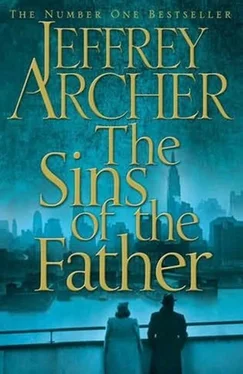Giles continued to check his watch every few minutes. The next signpost confirmed they were making good time, but Giles knew they had no control over when the commandant’s last guest would leave and Colonel Schabacker would go in search of his car and driver.
It was another forty minutes before they reached the outskirts of Schaffhausen. They were both so nervous that hardly a word had passed between them. Giles was exhausted just sitting in the back seat, doing nothing, but he knew they couldn’t afford to relax until they had crossed the Swiss border.
When they entered the town, the locals were just beginning to wake up; the occasional tram, the odd car, a few bicycles ferrying people who were expected to work on New Year’s Day. Terry didn’t need to look for signs to the border, as he could see the Swiss Alps dominating the skyline. Freedom felt as if it was touching distance away.
‘Bloody hell!’ said Terry as he slammed on the brakes.
‘What’s the problem?’ said Giles, leaning forward.
‘Look at that queue.’
Giles stuck his head out of the window to see a line of about forty vehicles, bumper to bumper, ahead of them, all waiting to cross the border. He checked to see if any of them were official cars. When he was sure there were none, he said, ‘Drive straight to the front. That’s what they’d expect us to do. If we don’t, we’ll only draw attention to ourselves.’
Terry drove slowly forward, only stopping when he reached the barrier.
‘Get out and open the door for me, but don’t say anything.’
Terry turned off the engine, got out and opened the back door. Giles marched up to the customs post.
A young officer leapt up from behind his desk and saluted when he saw the colonel enter the room. Giles handed over two sets of papers that the camp forger had assured him would pass muster at any border post in Germany. He was about to find out if he’d exaggerated. As the officer flicked through the documents, Giles tapped the side of his leg with his baton and glanced repeatedly at his watch.
‘I have an important meeting in Zurich,’ he snapped, ‘and I’m running late.’
‘I’m sorry, colonel. I’ll get you on your way as soon as possible. It should only take me a few moments.’
The officer checked the photograph of Giles on his papers, and looked puzzled. Giles wondered if he’d have the nerve to ask him to remove his scarf, because if he did, he would immediately realize that he was too young to be a colonel.
Giles stared defiantly at the young man, who must have been weighing up the possible consequences of holding up a senior officer by asking him unnecessary questions. The scales came down in Giles’s favour. The officer nodded his head, stamped the papers and said, ‘I hope you won’t be late for your meeting, sir.’
‘Thank you,’ said Giles. He put the documents back in an inside pocket and was walking towards the door when the young officer stopped him in his tracks.
‘Heil Hitler!’ he shouted.
Giles hesitated, turned slowly around and said, ‘Heil Hitler,’ giving a perfect Nazi salute. As he walked out of the building, he had to suppress his laughter when he noticed that Terry was holding open the back door with one hand, and holding up his trousers with the other.
‘Thank you, Hans,’ said Giles as he slumped into the back seat.
That was when they heard a banging noise coming from the boot.
‘Oh my God,’ said Terry. ‘Hans.’
The brigadier’s words came back to haunt them; no escape plan can ever be foolproof. In the end, it all comes down to how you cope with the unforeseen.
Terry closed the back door and returned to his place behind the wheel as quickly as he could, as he feared the guards would hear the banging. He tried to remain calm as the barrier rose inch by inch, and the banging became louder and louder.
‘Drive slowly,’ said Giles. ‘Don’t give them any reason to become suspicious.’
Terry eased the gear lever into first and drove slowly under the barrier. Giles glanced out of the side window as they passed the customs post. The young officer was speaking on the phone. He looked out of the window, stared directly at Giles, jumped up from his desk and ran out on to the road.
Giles estimated that the Swiss border post was no more than a couple of hundred yards away. He looked out of the back window to see the young officer waving frantically, as guards carrying rifles poured out of the customs post.
‘Change of plan,’ said Giles. ‘Step on the accelerator,’ he shouted as the first bullets hit the back of the car.
Terry was changing gear when the tyre burst. He tried desperately to keep the car on the road, but it swerved from side to side, careered into the side railings and came to a standstill midway between the two border posts. Another volley of shots quickly followed.
‘My turn to beat you to the washroom,’ said Giles.
‘Not a hope,’ said Terry, who had both feet on the ground before Giles had dived out of the back door.
They both began running flat out towards the Swiss border. If either of them was ever going to run a ten-second hundred, it would be today. Although they were dodging and changing direction in their attempt to avoid the bullets, Giles still felt confident that he would cross the finishing line first. The Swiss border guards were cheering them on, and when Giles dipped at the tape, he raised his arms in triumph, having finally defeated his greatest rival.
He turned around to gloat, and saw Terry lying in the middle of the road about thirty yards away, a bullet wound in the back of his head and blood trickling from his mouth.
Giles fell on his knees and began to crawl towards his friend. More shots rang out as two Swiss border guards grabbed him by the ankles and pulled him back to safety.
He wanted to explain to them that he didn’t care to have breakfast alone.
1939-1942
HUGO BARRINGTON COULDN’T remove the smile from his face when he read in the Bristol Evening News that Harry Clifton had been buried at sea within hours of war being declared.
At last the Germans had done something worthwhile. A U-boat commander had single-handedly solved his biggest problem. Hugo began to believe it might even be possible that, given time, he could return to Bristol and resume his place as deputy chairman of the Barrington Shipping Line. He would begin to work on his mother with regular phone calls to Barrington Hall, but only after his father had left for work each day. That night he went out to celebrate, and arrived home as drunk as a lord.
When Hugo first migrated to London following his daughter’s aborted wedding, he rented a basement flat in Cadogan Gardens for a pound a week. The only good thing about the three-roomed accommodation was the address, which created the impression that he was a man of means.
Although he still had a few bob in the bank, it soon dwindled, while he had time on his hands and no regular source of income. It wasn’t long before he had to let go of the Bugatti, which kept him solvent for a few more weeks, but only until the first cheque bounced. He couldn’t turn to his father for help, because he’d cut him off, and frankly Sir Walter would have given Maisie Clifton a helping hand before he’d lift a finger to assist his son.
After a fruitless few months in London, Hugo tried to find a job. But it wasn’t easy; if any potential employer knew his father, he never even got an interview, and when he did, his new boss expected him to work hours he hadn’t realized existed, and for a wage that wouldn’t have covered his bar bill at the club.
Hugo began to dabble what little he had left on the stock exchange. He listened to too many old school chums telling him about deals that couldn’t fail, and even got involved in one or two more shady enterprises that brought him into contact with what the press described as spivs, and his father would have considered crooks.
Читать дальше












